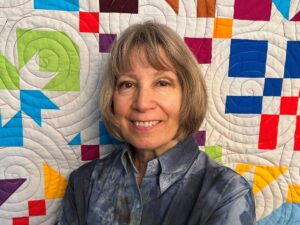Quilt Show Appraisals
 The 2024 Schoolhouse Quilt Show & Competition is pleased to welcome Dawn Heefner, American Quilters Society Certified Quilt Appraiser, who will join us on Friday and Saturday, June 21 and 22, for appraisal appointments.
The 2024 Schoolhouse Quilt Show & Competition is pleased to welcome Dawn Heefner, American Quilters Society Certified Quilt Appraiser, who will join us on Friday and Saturday, June 21 and 22, for appraisal appointments.
Dawn has been an AQS-Certified appraiser since 2003, practicing in the Pennsylvania-South Jersey-Delaware-Maryland area. Her work covers newly made quilts as well as antiques.
She is a member of PAAQT, the Professional Association of Appraisers of Quilted Textiles, and adheres to Uniform Standards of Professional Appraisal Practice (USPAP)
Dawn has participated in quilt documentations in Pennsylvania, Delaware, and Maryland, and has co-authored several of the resulting books.
She has been active in the American Quilt Study Group, and has studied textiles and quilts on both sides of the Atlantic.
Why should I have my quilt appraised?
 According to QuiltingHub, in case of a loss or damage, most insurance companies determine the replacement value of a quilt at the same rate you might purchase a standard blanket from a retail store. We all know quilts contain hours of detailed hand and machine work that make them much more valuable. Plus, written appraisals help establish the provenance, or ownership, of a quilt, over time.
According to QuiltingHub, in case of a loss or damage, most insurance companies determine the replacement value of a quilt at the same rate you might purchase a standard blanket from a retail store. We all know quilts contain hours of detailed hand and machine work that make them much more valuable. Plus, written appraisals help establish the provenance, or ownership, of a quilt, over time.
If you are considering whether an appraisal is right for you, here are some things you might not know:
- There are standards that quilt appraisers follow. Quilt appraisers are well-educated and are certified by professional organizations.
- Be aware that a retail associate at an antique store is probably not certified. Also, if the person offers to purchase the quilt, you most likely aren't dealing with a certified appraiser as this violates ethical obligation as a certified appraiser.
- The appraiser will need to see the quilt in person. A photograph will not tell the appraiser enough about the fabric and the workmanship.
- There is more than one way to appraise a quilt. Just as in real estate, some are valued at the fair market price. That means the value assigned is the same as that for which a similar quilt has sold. This method means that you may be able to purchase a similar item for the specified amount. The comparable quilts would be similar in pattern and fabric. These quilts may not appraise for as much as the owner might wish, but certainly more than a big box store blanket.
- Fair market value is the only method available for vintage and antique quilts.
- Another method is reconstruction of a similar quilt. This method might be used when a quilt is unique in idea, construction, etc. These quilts generally have no market equivalent and might appraise at a higher value than expected. Labor-intensive design elements used in reconstruction would increase the replacement price.
- Due to the above, an appraisal should be done every three to five years.
- A history of quilt sales by a quilter would also be taken into consideration. Sales receipts for such sales should be given to the appraiser.
- A complete description of the quilt, including photographs, measurements, and the appraiser's workmanship comments are included with the appraisal.
Appraisal Appointments
A limited number of verbal appraisal appointments are also available at $45.00 per appointment. To schedule, please contact us at 301.777.2787 or at jwestendorff@alleganyarts.org.



